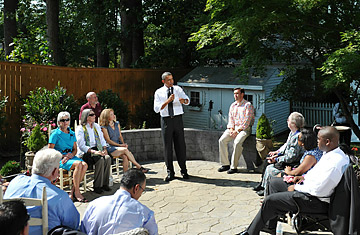
President Barack Obama discusses health care reform at a home in Falls Church, Va., on Sept. 22, 2010
With just a month to go before the midterms, we've reached the moment when almost everyone who follows the American electoral carnival begins to lose their mind, head and perspective; when every development is an October Surprise in the making; when every twist is the final nail in the coffin of democracy. Here are five suggestions for how to watch the action but still keep calm and stay smart.
1. Not All Polls Are Created Equal
Even surveys by respectable polling organizations can sometimes be askew — never mind polls done with small samples, flawed methodology or moronically phrased questions. Cable, talk radio and the Internets will all go loco over every digit and supposed trend. If you are constitutionally unable to think about the elections in terms of anything but polling data, at least examine a series of survey results from solid samples before reaching any conclusions, rather than (over)reacting to the latest dramatic number.
2. Obama Thermometer
The President is a great fourth-quarter player, so you can be assured that he will be fired up and ready to go over the next 30 days, giving speeches that recall his glory days in Campaign '08. Some will see in this a rising Democratic tide, but don't imagine there is an automatic correlation. A last-minute Obama-led rally to save his party will be tough to pull off. Asked about the chances for such a comeback, Mississippi's Republican governor, Haley Barbour, recalled the autumn of 1994, when a struggling Bill Clinton returned from a mojo-churning trip to the Middle East and hit the campaign trail to rev up Democratic-base voters. "When he came back," Barbour said in a recent interview, "he went out and campaigned for a bunch of people and their numbers sank." Barbour compared the politically ailing Clinton and his party — and Obama and the Democrats today — to a person afflicted with consumption, saying that what appeared to be recovery was in fact "a hectic flush." That, Barbour says, is when "you're dying of this terrible lung disease and for whatever reason, you sort of perk up and you perk up for a day or two, and you're feeling better. Your head clears and then you die. I always said that President Clinton's trip to the Middle East in 1994 generated a hectic flush. He came back, his poll numbers went up and he went out and campaigned for all these guys and they all died ... You have to be careful that sometimes you increase your base turnout a little bit and exacerbate what people are mad about a lot." Barbour might not be on target with this Clinton-Obama analogy — but, then again, he might be.
3. Watch Where They Campaign
Like Barbour, a lot of the Republicans who are currently considering a run for the nomination in 2012 will be out on the road in the next month campaigning for candidates on November's ballot. All of the men and women who might want to replace Obama in the White House will be looking for chits to cash in down the road. Check out who is wanted where, particularly for public events in blue and purple areas. Who will be invited to Connecticut to appear with Senate hopeful Linda McMahon? How about in central Iowa, where Terry Branstad is running to recapture the governor's slot? A similar dynamic holds on the Democratic side, since Vice President Joe Biden's blue collar cred will allow him to comfortably campaign in some areas that are politically off-limits for the President. Where Biden goes — and Obama doesn't — will reveal much of what the President's pollsters are finding out about their respective strengths and weaknesses.
4. Governors Govern
The national media is obsessed with the fight for control over the House and the Senate, but keep a close eye on the gubernatorial races. Many big-state contests hang in the balance, but Republicans are positioned to win the solid center of the country, with victories likely or near certain in Michigan, Iowa, Wisconsin, Pennsylvania and Ohio. At the same time, if Democrats can pull out wins in three or four of the Big Quartet — California, Florida, New York and Texas — Obama's party will have enough to crow about to offset their inevitable congressional losses.
5. Now Determines Later
The negative ads will fly, leaders will be demonized and the outcome will be uncertain until the votes are counted, but one factor to track from today through January is the contours of governance being laid down now. As these two fortnights of fun unfold, please remember: campaigns beget governing. With all the focus on who will be chosen to help guide the country alongside Obama these next two years, don't forget this corollary question: What will the key political relationships be like that are determined by action and rhetoric between now and Nov. 2? The three biggest barriers the President faces in getting his remaining agenda enacted in 2011 and 2012 are his Republican opponents, the business community and the media. Will there be gridlock or will we see compromise on the big issues facing the country, including energy, deficit reduction, education, job creation, immigration and Afghanistan? Elections are, by definition and necessity, partisan. But, especially in today's politico-media freak-show environment, conduct counts.
One Nation, Halperin's politics column for TIME.com, appears every Monday.
